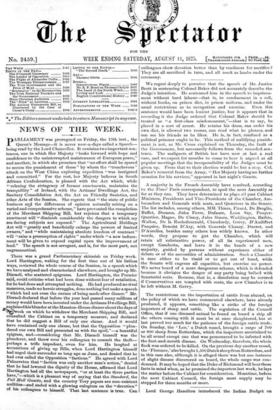We regret deeply to perceive that the speech of Mr.
Justice Brett in sentencing Colonel Baker did not accurately describe the Judge's intention. He sentenced him in the speech to imprison- ment without hard labour—that is, to confinement in a cell, without books, on prison diet, in prison uniform, and under the usual restrictions as to occupation and exercise. Even this sentence would have been lenient justice, but it appears that in recording it the Judge ordered that Colonel Baker should be treated as "a first-class misdemeanant,"—that is to say, be placed in a sort of arrest. He retains his dress, ean order his own diet, is allowed two rooms, can read what he pleases, and can see his friends as he likes. He is, in fact, confined as a political prisoner ought to be. This method of nullifying punish- ment is not, as Mr. Cross explained on Thursday, the fault of the Government, but necessarily follows from the recorded sen- tence. The mal'gners of British law have now at last a real case, and we expect for months to come to hear it argued at all popular meetings that the irresponsibility of the Judges must be given up. From that to their election would be but a step. Col. Baker's removal from the Army, "Her Majesty having no further occasion for his services," appeared in last night's Gazette.






























